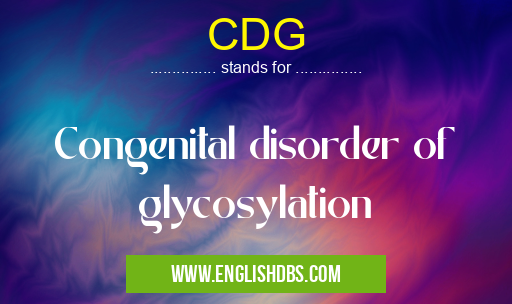What does CDG mean in CLINICAL MEDICINE
Congenital Disorder of Glycosylation (CDG) is an inherited rare condition that affects the body's ability to produce molecules known as glycosylation. This process is necessary for the production and proper functioning of many proteins and lipids, which are vital for normal bodily processes. People with CDG typically experience a variety of symptoms, including developmental delays, physical abnormalities, heart problems, and neurological defects. Generally speaking, individuals with CDG require lifelong medical care to manage their symptoms.

CDG meaning in Clinical Medicine in Medical
CDG mostly used in an acronym Clinical Medicine in Category Medical that means Congenital disorder of glycosylation
Shorthand: CDG,
Full Form: Congenital disorder of glycosylation
For more information of "Congenital disorder of glycosylation", see the section below.
Essential Questions and Answers on Congenital disorder of glycosylation in "MEDICAL»CLINICAL"
What causes Congenital Disorder of Glycosylation?
Congenital Disorders of Glycosylation (CDG) occur when a person inherits an alteration in one or more genes involved in the glycosylation process from his or her parents. Alterations in these genes can affect the body's ability to produce glycoproteins and other related molecules.
What are some common symptoms associated with CDG?
Common symptoms associated with CDG include developmental delays, physical abnormalities such as facial differences, cardiac problems such as heart defects and arrhythmias, neuromuscular disorders such as seizures or hypotonia (low muscle tone), vision issues such as blindness or decreased vision acuity, hearing loss, liver dysfunction including hepatic failure or cholestasis (the inability for bile acids to enter the intestine), gastrointestinal abnormalities such as malabsorption or diarrhea due to pancreatic insufficiency and metabolic disorders such as hypoglycemia.
How is CDG diagnosed?
A diagnosis of Congenital Disorder of Glycosylation can be made through genetic testing that examines changes in the gene responsible for glycoprotein production and its downstream effects on other areas of metabolism. In addition, certain blood tests may be used to identify deficiencies in certain enzymes involved in glycosylation pathways. An individual may also be tested for antiglycan antibodies that are often present in people with this disorder.
Is there any treatment available for people with CDG? A4: Treatment for people with Congenital Disorder of Glycosylation depends largely on the type and severity of symptoms experienced by each individual. Generally speaking, treatment focuses on managing specific symptoms so an individual can still lead a relatively normal life. For example, physical therapy may help improve muscle tone while occupational therapy may help improve coordination skills; dietary modifications may help manage digestive issues; medications may be used to control seizures; cognitive therapy may help improve language skills; assistive technology devices may be used to facilitate communication abilities; and surgical interventions can address certain structural issues like heart anomalies or aberrant eye movements. Q5: Are there any support services available for families affected by CDG?
Treatment for people with Congenital Disorder of Glycosylation depends largely on the type and severity of symptoms experienced by each individual. Generally speaking, treatment focuses on managing specific symptoms so an individual can still lead a relatively normal life. For example, physical therapy may help improve muscle tone while occupational therapy may help improve coordination skills; dietary modifications may help manage digestive issues; medications may be used to control seizures; cognitive therapy may help improve language skills; assistive technology devices may be used to facilitate communication abilities; and surgical interventions can address certain structural issues like heart anomalies or aberrant eye movements. Q5: Are there any support services available for families affected by CDG? A5: Yes—there are several organizations dedicated to providing resources and assistance to families affected by Congenital Disorders of Glycosylation. Many offer financial support programs that cover medical costs associated with caring for someone living with this disorder as well as emotional support groups where families can connect with peers who are also raising children with special needs caused by CDGs. Additionally, some offer educational resources about managing daily life when raising a child who has special needs due to this condition.
Final Words:
: All in all,Congenital Disorder of Glycosylation is a rare condition that affects many aspects of an individual's health due its impact on their body's production of proteins necessary for normal bodily processes. Although there is no cure yet,treatment options exist which focus primarily on managing symptom so individuals lead a relatively normal life. Finally,several organizations provide invaluable resources and assistance to those affected by CDG.
